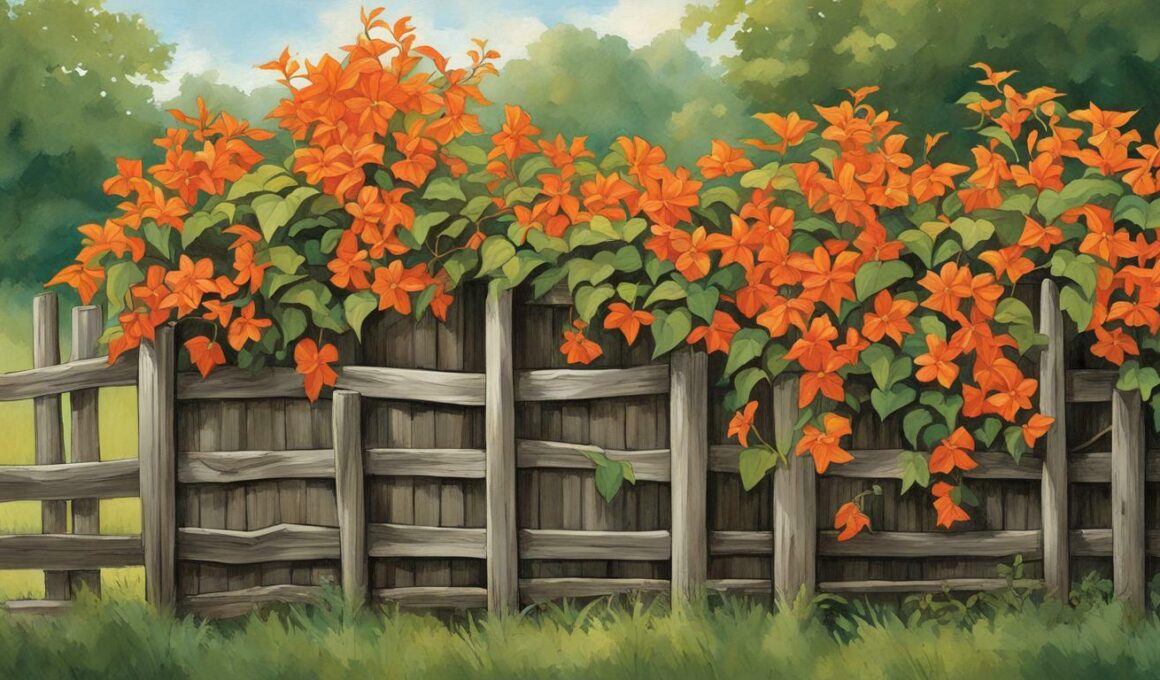If you are a gardening enthusiast in Tennessee, you may have come across the beautiful Trumpet Vine. But, is this plant native to the state or was it brought in from elsewhere? In this section, we will explore the origins of Trumpet Vine and provide you with accurate information to help you understand this stunning plant better.
Post Summary:- Find out whether Trumpet Vine is native to Tennessee.
- Gain a deeper understanding of this captivating plant’s characteristics and features.
Understanding Trumpet Vine
Trumpet Vine, also known as Campsis Radicans, is a climbing plant that belongs to the family Bignoniaceae. It is a native of the southeast United States and a popular ornamental plant for its bright trumpet-shaped flowers that bloom in summer.
The plant has a woody stem that can grow up to 40 feet in length, and its leaves are deciduous, turning yellow in autumn. The orange-red flowers of the Trumpet Vine attract hummingbirds, bees, and butterflies.
Trumpet Vine can be grown in various soil types and sun exposures, but it prefers well-drained soil and full sun. The plant is also tolerant of drought and pollution.
The Features of Trumpet Vine
The Trumpet Vine’s trumpet-shaped flowers and large leaves make it a unique and attractive landscape plant. Its twining habit allows it to climb up walls, trellises, and trees, making it an ideal statement piece in any garden. The flowers bloom in the summer, producing a vibrant display of colors that can add life to any outdoor space.
The plant’s fast growth rate can be both an advantage and a disadvantage, depending on the gardener’s preference. While it can quickly fill up empty spaces and provide quick coverage, it can also be invasive if not kept in check.
Trumpet Vine is relatively easy to care for and can thrive for many years if provided with proper maintenance. Regular pruning can help control its spread and promote new growth.
Did You know? In traditional medicine, the Trumpet Vine has been used to treat various ailments such as fever, arthritis, and skin infections. However, it should be noted that the plant contains toxic compounds, so its consumption should be avoided.
Native Plants of Tennessee
Tennessee is home to a vast array of beautiful plants, many of which are native to the state. From the vibrant flowers of the Black-eyed Susan to the towering trees of the Eastern Hemlock, the natural flora found here is as diverse as the state’s landscapes.
The Trumpet Vine, while not exclusive to Tennessee, is one of the native plants that thrive in the state’s climate. This woody vine is known for its striking appearance and its ability to attract a variety of pollinators, making it a valuable addition to any garden or landscape.
Other native plants in Tennessee include the Dogwood, the Honeysuckle, and the American Holly. These plants, along with many others, play a vital role in the state’s ecosystem. They provide food and shelter for local wildlife and help maintain the delicate balance of the state’s natural habitats.
“Tennessee’s native plants are not only beautiful, but they also serve an essential ecological purpose. They are a crucial part of the state’s natural heritage and should be celebrated and preserved.”
Whether you’re a seasoned gardener or a nature enthusiast, exploring the native plants of Tennessee is a rewarding experience. Take a leisurely hike through the state’s parks and trails and marvel at the wildflowers, trees, and shrubs that call this area home.
- Black-eyed Susan
- Eastern Hemlock
- Dogwood
- Honeysuckle
- American Holly
Trumpet Vine’s Origins
Have you ever wondered where the Trumpet Vine came from? This beautiful plant has a rich historical presence and intriguing origins.
The Trumpet Vine, also known as the Campsis radicans, is native to the southeastern United States, including Tennessee. However, it’s believed that its ancestors originated in China, Japan, and Korea. The plant was introduced to North America in the late 1600s as a decorative plant and has since become a favorite among gardeners and landscapers.
The Trumpet Vine’s scientific name, Campsis radicans, was given by the famous Swedish botanist Carolus Linnaeus. “Campsis” is derived from the Greek word “kampsis,” which means bend or curve, while “radicans” refers to its root system that clings to surfaces where it grows, such as walls, trellises, and fences.
Since its introduction to North America, the Trumpet Vine has thrived in a variety of environments and is now considered an invasive species in some areas. Its ability to adapt to different soil and light conditions, coupled with its fast growth rate, has made it an attractive option for those seeking to add color and texture to their landscapes.
Trumpet Vine in Tennessee
When it comes to Tennessee’s native flora, the Trumpet Vine is a familiar sight. This beautiful plant is known for its showy orange-red flowers that attract hummingbirds, bees, and butterflies.
While the Trumpet Vine is not exclusive to Tennessee, it thrives in the state’s diverse natural habitats. You can find it growing in a variety of landscapes, including forests, fields, and along roadsides.
In fact, the Trumpet Vine is so adaptable that it can grow in a range of soil conditions, from dry to moist and acidic to alkaline. Its hardiness makes it an excellent choice for Tennessee gardens and landscaping projects.
Furthermore, the Trumpet Vine is a low-maintenance plant that requires minimal care. Once established, it can survive periods of drought and neglect, and its rapid growth rate makes it an ideal option for creating a natural privacy barrier or blocking unsightly views.
If you’re considering adding the Trumpet Vine to your Tennessee garden or landscape, keep in mind that it can become invasive if not pruned regularly. However, with proper care and attention, it can be a stunning addition to your outdoor space.
Trumpet Vine Varieties in Tennessee
There are several varieties of Trumpet Vine that are commonly found in Tennessee, including:
| Variety | Description |
|---|---|
| Campsis radicans | The most common variety, known for its vibrant orange-red flowers. |
| Campsis grandiflora | A larger variety that produces showy yellow flowers. |
| Campsis tagliabuana | A hybrid variety that features a blend of orange and yellow flowers. |
No matter which variety you choose, the Trumpet Vine is sure to add a pop of color and natural beauty to your Tennessee landscape.
Is Trumpet Vine an Evergreen Plant?
The trumpet vine’s evergreen status revealed: Although trumpet vines are visually appealing, they are not classified as evergreen plants. Unlike evergreen varieties, trumpet vines shed their leaves during the fall season, making them deciduous. However, their stunning trumpet-shaped flowers compensate for their lack of evergreen foliage.
Benefits of Trumpet Vine in Tennessee
Having the Trumpet Vine in your Tennessee garden or landscape provides numerous benefits. Here are just a few:
- Attracts Wildlife: The Trumpet Vine’s nectar and bright petals attract hummingbirds, bees, and butterflies.
- Aesthetic Appeal: With its vibrant orange and red flowers, the Trumpet Vine adds a splash of color to your garden or landscape.
- Durable: This vine is hardy and can withstand hot, dry summers as well as cold winters.
- Covers Unsightly Areas: The Trumpet Vine’s vigorous growth can quickly cover walls, fences, and other unsightly areas.
- Low Maintenance: Once established, the Trumpet Vine requires little to no maintenance, making it an easy addition to your landscape.
Overall, the Trumpet Vine is a beautiful and beneficial addition to any Tennessee garden or landscape. Give it a try and see for yourself!
Conclusion
Congratulations, you have gained a deeper understanding of the Trumpet Vine and its relationship to Tennessee. Through our exploration, we have discovered that the Trumpet Vine is not native to Tennessee, but it has found a place in the state’s diverse ecosystems.
Why Knowing About Native Plants Is Important
Learning about the native plants of your area is crucial in maintaining a healthy and diverse ecosystem. By planting native plants, you can help support local wildlife and maintain the natural beauty of your surroundings.
In conclusion, while the Trumpet Vine may not be native to Tennessee, it is a beautiful and beneficial addition to any garden or landscape. Consider adding this captivating plant to your own outdoor space to enhance its aesthetic appeal and contribute to the local ecosystem.
FAQ
Q: Is the Trumpet Vine native to Tennessee?
A: Yes, the Trumpet Vine is native to Tennessee.
Q: What are the characteristics of the Trumpet Vine?
A: The Trumpet Vine is known for its vibrant trumpet-shaped flowers, vining growth habit, and ability to attract hummingbirds and butterflies.
Q: What are some other native plants found in Tennessee?
A: Tennessee is home to a variety of native plants, including the Eastern Redbud, Black-eyed Susan, and Eastern Purple Coneflower.
Q: Where did the Trumpet Vine originate from?
A: The Trumpet Vine originated from North America, including Tennessee.
Q: How common is the Trumpet Vine in Tennessee?
A: The Trumpet Vine is fairly common in Tennessee and can be found growing in gardens, along fences, and in natural areas.
Q: What are the benefits of having Trumpet Vine in Tennessee?
A: Having Trumpet Vine in your Tennessee garden or landscape can attract wildlife, provide beautiful flowers, and contribute to the state’s natural beauty.









